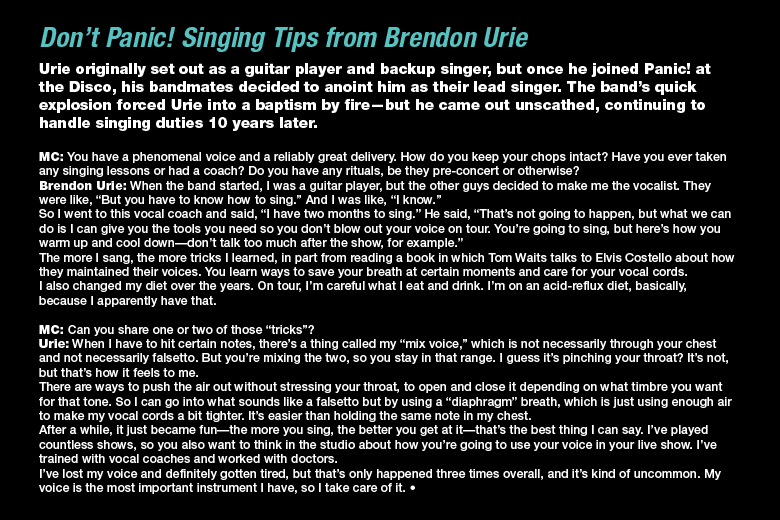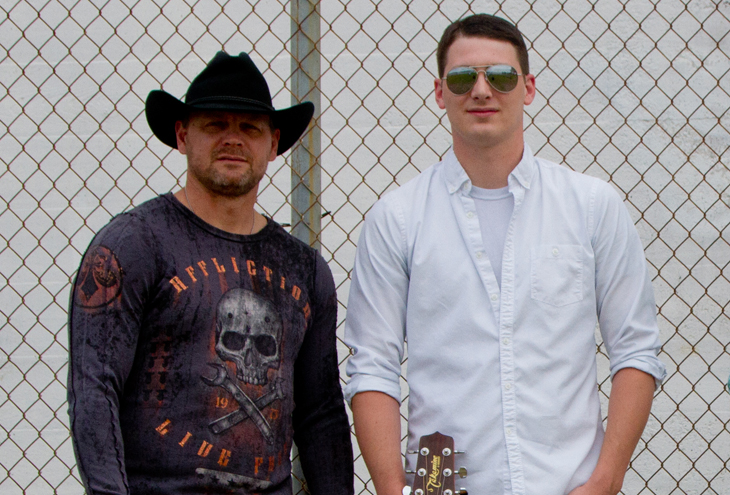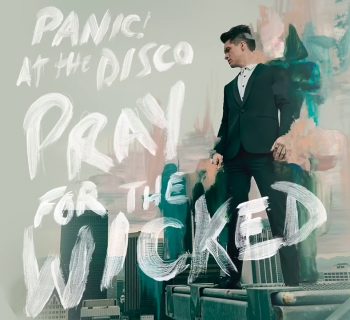It is as much of a miracle as it is a mystery that Panic! at the Disco [P!ATD] are still around. What started as a pet project by Las Vegas high schoolers Ryan Ross and Spencer Smith soared to popularity in the mid-Aughts and—despite the co-founders jumping ship—is ready to release what could be 2016’s first chart-topping rock album, Death of a Bachelor.
At its helm is Brendon Urie, who joined P!ATD soon after it formed in 2004 and accidentally became its lead vocalist. The band quickly became famous after Fall Out Boy bassist Pete Wentz signed them to his Decaydance imprint and helped them crash the emo/alt-rock scene in September 2005 with their debut, A Fever You Can’t Sweat Out. The band relocated to Maryland and, eventually, Los Angeles.
P!ATD established themselves as a unique vehicle for baroque pop and carnival-themed videos and concerts. They also had the MTV crowd in their pocket thanks to the infectious single “I Write Sins Not Tragedies,” which won Video of the Year at the 2006 MTV Video Music Awards.
Less than two years after forming, P!ATD had achieved platinum success—a rarity for a rock band in that era—and were headlining their own shows.
Like seemingly every rock band that makes it big, P!ATD swapped out their bass player a couple of times, in 2006 and 2009. But it was the departure of Ross in the latter year that marked a sea change in the band, with Urie choosing to take it into a defiantly pop direction.
P!ATD continued its winning ways in the ensuing five years, performing regularly with their Fall Out Boy compatriots, teaming with fun. for a tour and releasing an album every two or three years (Pretty. Odd. in 2008, Vices & Virtues in 2011 and Too Weird to Live, Too Rare to Die! in 2013).
The cord connecting P!ATD to its original incarnation was severed in April of this year, when Smith (who had publicly battled alcohol and prescription medications) left the fold. Shortly thereafter, Urie released “Hallelujah,” perhaps as if to reassure fans that P!ATD—now rounded out by guitarist Kenneth Harris, bassist/singer Dallon Weekes and drummer Dan Pawlovich—was still going strong.
See More: PHOTOS: Panic! at the Disco Album Release Show at Tower Theater
Music Connection: What excites you most about Death of a Bachelor? What are you most proud about with the record?
Brendon Urie: With this album, I have a love affair with each song individually. It’s a way more personal album than Panic’s past releases. I put in 100 percent of the work, so the challenge I took upon myself had the greatest reward.
Every song is different from each other, and it was fun to write a bunch of songs and see if they worked together on one album. I also learned some new tricks with production, recording and writing—new ways to keep the process exciting.
MC: In what ways is the album more personal?
Urie: Well, for example, I have a song called “LA Devotee,” which is a love letter to L.A. I’ve been here for just over seven years now, and it doesn’t feel like that long, but there are so many things that I’ve learned to enjoy about this town and living here.
MC: What specifically comes up in that song?
Urie: Oh man, the chorus starts off talking about “the black magic of Mulholland Drive” [near the infamous Wonderland Avenue murders and a Manson murder] and “pools under desert skies.” Those are just images that I carry with me on tour. I love driving on Mulholland and around the neighborhood and seeing how beautiful it actually is. Remembering all the history up here. It’s not so much going downtown and partying, it’s the infinite moments that no one else can share.
I wrote the title track on the piano. I wanted to write a Frank Sinatra song [in honor of his 100th birthday this year], but then I put it over a beat I had been working on separately, so I melded those two worlds together. I didn’t even know if it was going to be on the album, but it turned out to be the title track. I had a little revelation there.
MC: That song seems particularly sentimental for you. How did it evolve?
Urie: For “Death of a Bachelor,” I just recorded piano and vocal, trying to make something like an arrangement by [famed Sinatra bandleader] Nelson Riddle. I didn’t even know if it was going to make the album. But then I took the piano out and started adding all these [Roland TR-] 808 [drum beats]. It became something entirely different that I didn’t originally envision, this monster.
There were a couple of other big moments like that for me. I was working out a song called “Don’t Threaten Me with a Good Time,” and it sampled “Rock Lobster” by the B-52’s. I honestly thought I would never get the rights to the song, but it was so cool because [B-52’s singer] Kate [Pierson] signed off on it. That never happens—it’s usually, “Fuck off, whatever.”
I also wanted the song to sound like Queen, that was the original idea. So I stacked harmonies on harmonies on harmonies, and created different characters. I told myself “Okay, I’m going to sound more like [drummer/singer] Roger Taylor and a soul singer.”
Some of my favorite moments are on that song, especially when the Queen harmonies swell in.
MC: Were you more involved with the production of Bachelor compared with past Panic releases?
Urie: Yeah, it’s kind of progressed. I kind of took the reins with songwriting and producing on our third album [Vices & Virtues]. This album is me even more so. The more I would write, the more I would figure out new things to try.
MC: Was the idea of crafting the album by yourself intimidating?
Urie: I don’t know about intimidating, but it was daunting. There’s a lot of work that goes into it that I didn’t realize. “Showing up” is the rule I have: As long as I show up in the studio, usually something happens, and I’ll find myself in a place where I’m excited, creatively.
MC: So what was daunting about the recording process, and what surprises revealed themselves as you got deeper into it?
Urie: Well, originally, I gave DCD2 just one completed song, “Hallelujah.” I was like, “Hey guys, what do you think of it?” They were like, “We’re going to put it out next week.” So I had kind of an “Oh shit” moment and said, “Well, I don’t really have an album, guys.” And they said, “Well, get to work.” And I said, “Oh, okay.”
It was nice to know that I had to get something done. I didn’t necessarily have a deadline, but them releasing the song was enough of a reason to start spearheading a new project that includes the single. But it kicked my ass a little bit, having to write the album after the first single had already come out.

MC: Did you feel as strongly about the release of that single as the label?
Urie: Yes. I get to choose my favorite songs of that moment. There were times on previous albums where some songs weren’t as strong as others. But with this album, I don’t want to skip any tracks. Having a love affair with each song definitely helps.
MC: Do you think you have a love affair with this album because each song is yours?
Urie: Definitely. Every song is about something I’ve gone through or that I’m going through at that moment.
MC: To what extent does Panic’s management provide career direction? Besides Pete, in whom do you confide when it comes to making important decisions?
Urie: There are a few people. I have a day-to-day guy named Scott [Nagelberg of Crush Management], who I talk to, and others who I respect and never wonder if they have an ulterior motive. It’s such a good feeling to me, because it can be soul-crushing if you don’t have that type of support.
MC: Have they been supportive of you going through different incarnations, especially recently?
Urie: Oh yeah, definitely. There have been so many lineup changes in this band, and it can definitely be overwhelming, but Crush did such a good job handling all of that. Plus we have a great label who are like family. I’ve known them for so long now. I can get personal with them, and I have a personable attitude. It makes it feel more enjoyable.













